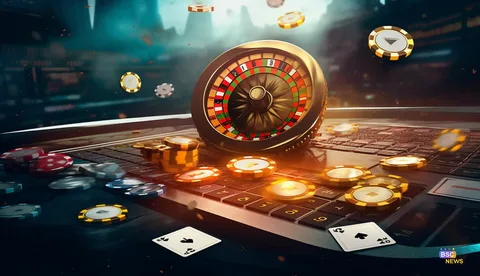The leaders of cultural houses, resort administrators, and event organizers arranged leisure activities without neon lights and signs. In the history of casinos in the USSR, players gathered in kitchens, announcers read out numbers on the air, cashiers sold tickets next to newspapers. The wheel with sectors appeared as a prop for festive programs and “cabbage parties,” rather than as a symbol of a legal gambling hall.
From Fairground Attractions to Club Evenings in the USSR: The History of Casinos in the 1920s-1950s
After the revolution, officials closed gambling halls, and local police officers cracked down on public gambling. Club managers shifted the focus to “useful leisure” and launched evenings of handicrafts, concerts, and table quizzes. Hosts sometimes set up an improvised wheel with prize sectors – candies, books, invitations. Journalists emphasized the educational tone in their notes, while administrators strictly limited bets to souvenirs.
Within these frameworks, the history of casinos in the USSR began not with a showcase, but with cautious formats where the wheel operated without money and without a cashier. The club director held the key to the storeroom with props, an accordion player provided music, and during breaks, news updates were read – such scenes looked ordinary for the Soviet agenda of the first decades. Cultural department lawyers referred to legislation, and hosts replaced risk with a souvenir lottery. Only “friends” were allowed to participate in card games, and only “for fun.”
Urban Scenarios: Moscow and Resorts
Cultural house managers in Moscow put together festive programs for specific dates, local studio announcers prepared announcements, and “Soyuzpechat” cashiers kept tickets – sport lotteries – under glass. Sanatorium instructors in Sochi made the “Wheel of Fortune” part of relaxation evenings: a drum, numbered sectors, a stand with small prizes. Prop masters assembled wheels from plywood, artists painted sectors, hosts explained the rules to prevent disputes. City residents and vacationers viewed the game as a harmless ritual, while organizers monitored the tone and timing.
For accounting purposes, accountants recorded expenses for props in the budget, the manager signed the invoice. Against this backdrop, the history of casinos in the USSR unfolded through the managerial decisions of people: Moscow provided scale, Sochi set the rhythm of the season, and the sport lottery diverted extra heat to the circulation. Discussions about the gambling business in the USSR remained focused on control and prevention, nothing more.
How “Wheel of Fortune” Was Operated: Roles, Rules, Stage
Hosts set up props in the hall, technicians checked the fastening, and the club manager reminded about discipline. The process unfolded as follows:
- The host announced the format: a game without money, only souvenirs. The hall reacted calmly, any disputes were resolved immediately.
- The technician secured the wheel, the assistant attached the arrow. The artist updated the numbering of the sectors.
- The cashier distributed tokens in advance according to the tickets; the accountant recorded the prize expenses in the ledger.
- The moderator brought the drum, allowed a guest to spin it, and read the sector out loud.
- The prop master handed out a souvenir; the administrator marked it as given to avoid repetition.
- The duty officer warned: disputes – only in the presence of witnesses. The host resolved conflicts on stage.
- In the finale, the host thanked the audience, the cleaner stored the props in the storeroom, and the club manager signed the report.
Underground Side: Katrans, Roulette, and Poker Without Showcases
Organizers of underground meetings agreed on meeting times at the entrance, the host took on the role of a dealer, and players brought decks of cards. In separate apartments, skilled craftsmen made “roulette-like” drums, but noise and risk gave away the room. Players often gathered for poker and other card games: they recorded bets, monitored the order of dealing, and agreed on a quiet mode. Cheaters tried to catch habits, but the elders quickly set up a barrier and escorted the “masters” out of the room.
The “point” administrator opened the door only to “their own,” the counter kept a debt journal, and the apartment owner closed the curtains. Money circulated in small amounts, and the gambling business of three courtyards did not turn into a network. Katrans lasted longer where organizers maintained silence and rules, and local police officers checked house registers more often than usual.
Cooperative 1980s in the USSR: The First Casinos in History and the Discussion on Legalization
By the end of the 1980s, cooperative founders rented premises in hotels, placed security at the entrance, hired duty administrators. Lawyers brought temporary regulations, accountants set up a cash register, and program directors included the “Wheel of Fortune” in the cultural evening lineup. Guests spun sectors for prizes, hosts monitored the pace, and security kept the passage clear. Officials discussed the legalization of certain formats at meetings and debated the boundaries of responsibility.
Journalists cautiously wrote about the first casinos in the USSR: without addresses and posters. Organizers acknowledged limits: they removed loud scenes, closed the cash register early, and double-checked guest lists. For the attraction, the wheel remained a safe element of the program, not a betting tool.
Why the Wheel Did Not Become the Showcase of Halls
Cultural house directors preserved their reputation, and local police officers reminded about regulations – the ban on gambling in the USSR lasted for decades. The club manager easily explained to the public: “the game is a gift, not money,” and conflicts were resolved in the hall within a minute. Resort administrators during the season directed flows to the dance floor, cinema, and concerts, so the wheel served as a “break” between performances. Props were secured with bolts, hosts checked the arrow, assistants verified the prize list.
In practical terms, this simply means that people made the “quiet” format work, while the “loud” one was not launched. Here, the history of casinos in the USSR did not intersect with large halls: the ban remained the foundation, and the word “ban” stood in every explanation. When someone tried to turn the stage into a betting arena, administrators turned off the lights and closed the hall for preparation. This is how actors maintained a balance between celebration and risk, without crossing the boundaries of legislation.
Conclusion
Organizers, hosts, cashiers, duty administrators, and local police officers – these roles set the rules of casinos in the USSR and maintained the rhythm throughout history. The wheel functioned as a prop in the human script: the host gave the word, the technician secured the axis, the accountant closed the budget. In the resort seasons of Sochi, the stage kept the hall from overheating; in Moscow’s cultural palaces, scriptwriters built evenings where the thrill was replaced with souvenirs.
 en
en  ru
ru  de
de  ar
ar  es
es  nl
nl  hi
hi  fr
fr  it
it  pt
pt  el
el 











